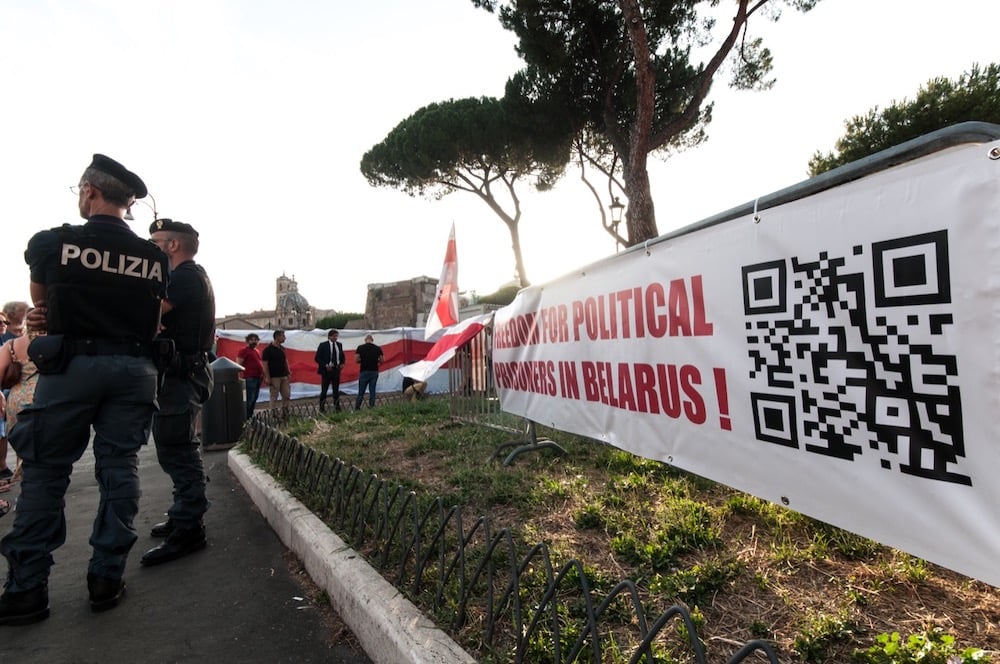July 2023 in Europe and Central Asia: A free expression round up produced by IFEX's Regional Editor Cathal Sheerin, based on IFEX member reports and news from the region.
July saw Bianet editors targeted in Turkey; new legislation threatening free expression and civil society in Belarus, Croatia, Republika Srpska and Russia; and welcome wins for rights advocacy in Kyrgyzstan and Azerbaijan.
Bianet editors targeted
July saw two Bianet editors targeted in Turkey, solely for exercising their right to freedom of expression.
On 27 July, it was revealed that Bianet Human Rights editor Ayça Söylemez is facing a lawsuit for “marking counterterrorism officials as a target” over a column she wrote for BirGün newspaper in 2020. The column in question was a commentary about a judge and some of the trials of journalists and politicians that he was then presiding over. That judge is now the Deputy Justice Minister and Söylemez faces up to three years in prison if convicted.
On 25 July, Bianet Women and LGBTI+ Rights editor Evrim Kepenek was one of five journalists who were detained – the others were Sibel Yükler, Delal Akyüz, Evrim Deniz and Fırat Can Arslan – for sharing an article by Arslan on Twitter. The article revealed that one of the judges overseeing a high-profile case against 18 Kurdish media workers is married to the prosecutor who prepared the indictment. The five journalists are reportedly under investigation for “disclosing, publishing and targeting a public official on anti-terror duties”. All were released after a short period apart from Arslan, who was placed in solitary confinement. An international travel ban has been imposed on Bianet’s Kepenek; a court has blocked access to Arslan’s article.
July brought a welcome development in the aforementioned case of the 18 Kurdish media workers: the 15 who were still behind bars were released pending trial. They had spent 13 months in pre-trial detention. All 18 are facing dubious terrorism charges.
A report published this month showed that online censorship in Turkey is increasing. The Freedom of Expression Association’s Blocked Web study showed that 137,000 web addresses were blocked in 2022. That represents a 28% increase on the figure for 2021, and sets a new record. According to the study, a total of 6,528 news reports considered to be in the public interest were blocked due to alleged “violations of the right to privacy”. Surprisingly, the website of government-friendly newspaper Sabah had the highest number of articles blocked.
“Responding to unfriendly actions”
On 1 July, President Lukashenka signed into law a bill that extends the authorities’ control over the media. According to the state-owned news agency BelTA, the bill – which amends the Law on Mass Media – is “aimed at improving the mechanisms for protecting national interests in the media sphere, as well as expanding the tools for responding to unfriendly actions against Belarus”.
The Committee to Protect Journalists (CPJ), which called for the law to be reversed, described it as translating already widely-used repressive practices into the legal sphere. The new legislation empowers the Ministry of Information to ban the activities of foreign media in Belarus in retaliation for “unfriendly actions” by a foreign state; it expands the basis for blocking foreign and local news sites; and it enables the state to withdraw a media outlet’s registration if its founder or owner is involved in “extremist” or “terrorist” activity. In recent years, several independent media outlets and civil society actors – such as IFEX member the Belarusian Association of Journalists (BAJ) – have been designated as “extremist” or “terrorist”.
Among those targeted with “extremism” charges in July were journalist Pavel Mazheika and lawyer Yulia Yurhilevich. They were each sentenced to six years in prison on charges of “promoting extremist activities”, based on their alleged sharing of information with the Poland-based Belsat TV channel. Belsat was designated “extremist” in 2021. As Human Rights Watch (HRW) points out, the information allegedly shared with Belsat was already available on Belarusian government websites and concerned Yurhilevich’s work defending political detainees and her disbarment by the authorities in 2022.
Towards the end of the month, former journalist Larysa Shchyrakova went on trial behind closed doors on charges of “facilitating extremist activities” and “discrediting Belarus”. She faces up to seven years in prison if convicted.
ARTICLE 19 highlighted the Belarusian authorities’ use of “anti-extremism” legislation to suppress civil society in a joint submission to the Special Rapporteur on the Situation of Human Rights in Belarus in June.
Next month (9 August) will see the third anniversary of the disputed presidential election that kept Lukashenka in power, triggered a wave of popular protest against the result, and launched a harsh crackdown on freedom of expression and civil society. IFEX members and others will be marking the anniversary in various ways. For a month-by-month overview of the key developments in Belarus since the 2020 election, check out IFEX’s Belarusian chronology.
Legislative attacks on civic space and free expression
It wasn’t just Belarus that saw worrying legislative developments in July.
Despite international and regional protests, defamation was re-criminalised in Republika Srpska (RS), the majority-Serb entity of Bosnia-Herzegovina. UN experts called on RS to repeal the legislation, pointing to the obvious risk it presents to freedom of expression and civic space in the country.
In Croatia, journalists’ groups strongly criticised a restrictive Media bill, the working draft of which was leaked to the public this month. Under the bill in its current form, a ‘register’ of journalists will be compiled; journalists will have to disclose their sources to their editors-in-chief; media owners will be able to refuse to publish a report without explanation, but a journalist will not be allowed to refuse an assignment without giving a good reason; the state will provide support for subscription sites, but only if they represent the online outlets of print media; and there will be a ban on journalists and media workers criticising the work of courts and state attorneys’ offices. The European Federation of Journalists (EFJ) described the bill as an effort to “stifle the media” and an “attempt by public officials to capture the media, as in Hungary and Poland”.
Russia continued its legislative war on human rights and civil society in July. Towards the end of the month, lawmakers in the parliament’s lower house adopted a bill that would effectively ban collaboration with foreign, unregistered NGOs. Punishments for infringing the law range from fines for a first offence to three years in prison for repeated offences. HRW described the legislation as an attempt to “further isolate Russian activists from their international colleagues and leave them without support in an increasingly hostile environment”.
The Russian government has been persecuting LGBTQI+ people for over a decade, and now seems determined to legislate Trans people out of existence. This month, President Putin signed legislation that bans health care workers from “performing medical interventions designed to change the sex of a person”, and prohibits changes to a person’s gender on official documents. The law also bans Trans people from becoming foster or adoptive parents and annuls marriages where one partner has already changed their gender.
Russia’s lower house of parliament also adopted an immunity law for crimes committed “in the interests of the Russian state”. According to HRW, the apparent aim of the law is to protect Russian soldiers, state officials and mercenaries from being held to account for human rights violations carried out in Russian-occupied Ukraine. There is very strong evidence that Russian forces have tortured, unlawfully detained, and forcibly disappeared civilians in occupied zones. According to the Institute of Mass Information (IMI), the Russian army has also committed 524 crimes against the media in Ukraine since the invasion began.
Welcome wins for rights advocacy
In Kyrgyzstan, a court order shutting down RFE/RL’s Kyrgyz Service (Radio Azattyk) was annulled in July. The shutdown was ordered over the media outlet’s refusal to remove a video showing last year’s clashes on the Kyrgyz-Tajik border, which also resulted in the authorities blocking RFE/RL’s website in October. Acting RFE/RL President Dr Jeffrey Gedmin credited the annulment of the shutdown to advocacy by the international community, in which IFEX members took part.
Also in July, the European Court of Human Rights (ECtHR) ruled that Azerbaijan violated journalist and human rights activist Emin Huseynov’s human rights when he was deprived of his citizenship by presidential decree in 2015. The revocation of Huseynov’s citizenship came after long-term persecution forced him to flee to exile. In 2018, IFEX, CPJ, International Media Support and the International Senior Lawyers Project submitted a third party intervention to the ECtHR in support of Huseynov.



